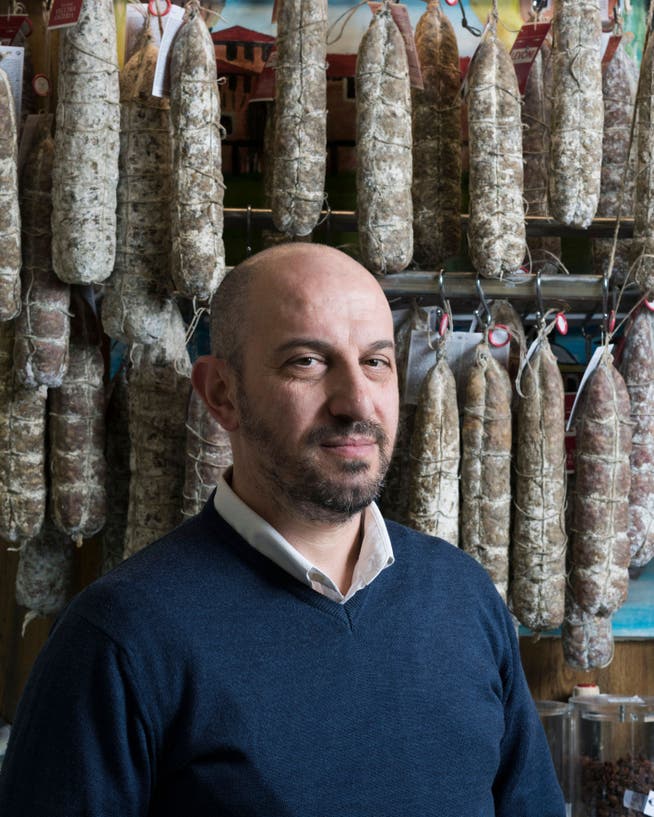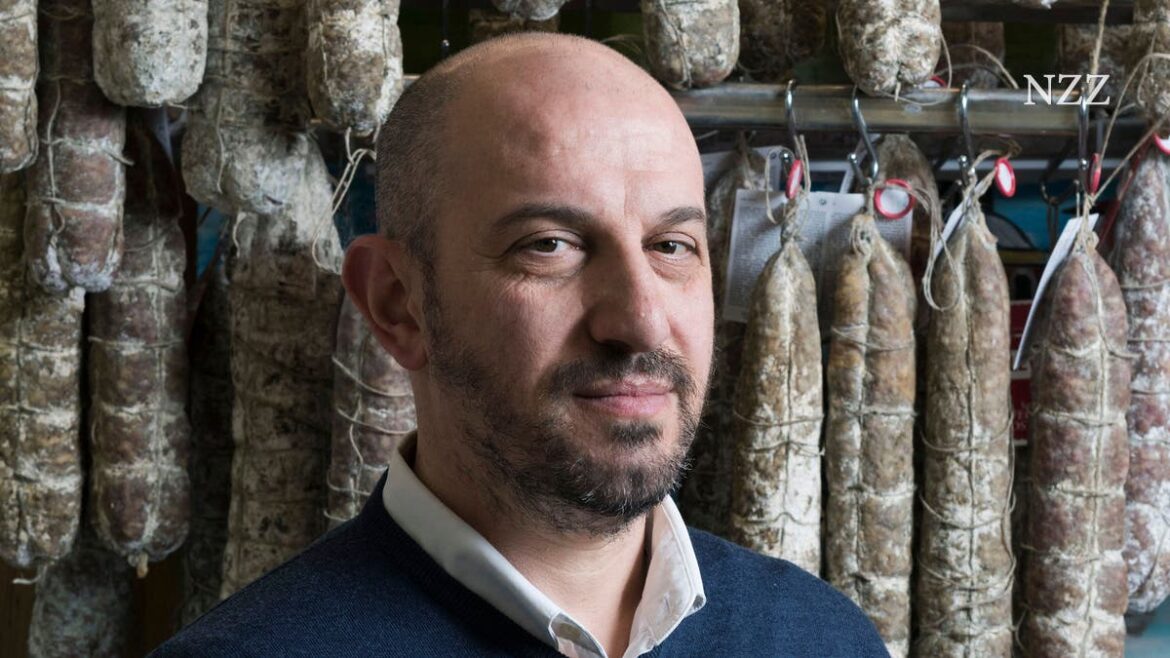Parmesan, carbonara, tiramisu and the like are less ancient and less Italian than previously thought. But is it okay to say that out loud? A conversation with a professor of economic history who hit a nerve.
 Alberto Grandi has caused outrage in Italy with an interview in the Financial Times. «I like controversy,» he says.
Alberto Grandi has caused outrage in Italy with an interview in the Financial Times. «I like controversy,» he says.
Martino Lombezzi / Laif
We’re in Parma, in the heart of Emilia-Romagna, where everything Italian originated: prosciutto, Parmesan, aceto balsamico – products that, like many others, are typical of the cuisine. But now, all of a sudden, that’s allegedly no longer true. At least not in the way that Italians, and with them all lovers of Italian culture and cuisine, have imagined it to be.
Optimieren Sie Ihre Browsereinstellungen
NZZ.ch benötigt JavaScript für wichtige Funktionen. Ihr Browser oder Adblocker verhindert dies momentan.
Bitte passen Sie die Einstellungen an.
Parmesan, for instance, virtually an Italian cultural asset, is protected and coddled by association officials who lobby hard in Rome and Brussels to prevent it from being counterfeited, copied and produced anywhere but the area around Parma and Reggio Emilia. But truly genuine Parmesan is supposedly manufactured in Wisconsin in the U.S. – according to someone who is a scientific expert on the issue: Alberto Grandi, professor at the Department of Economics at the University of Parma and specialist in business and food history.
«The Parmesan from Wisconsin is not as good as the one we make here today, but it’s much closer to the original product, the one our ancestors knew,» he says. While it was long forgotten in Emilia-Romagna, its region of origin, Italian emigrants in the United States prepared it according to old recipes. Its texture is fattier, the cheese softer and its rind black because it is treated with ash, as in the past, for the purpose of preservation. It was not until after World War II that Parmesan was further developed in Italy into the crumbly hard cheese that is sold and appreciated today.
A podcast and a book
Parmesan from Wisconsin? With findings like this, Grandi recently sent Italy into outrage and sparked a polemic that has reached all the way to the top of government. Carbonara? A pasta specialty imported from Chicago. Tiramisu? An invention of modern times. Panettone? Originally an industrial product. Tomato sauce? A Spanish invention, which was still called «salsa spagnola» in Italy until the late 19th century. Pesce crudo? Only came about with the big sushi wave.
Strictly speaking, Grandi has been acting as a myth-buster for years. In 2018, he published a book titled «Denominazione di origine inventata» (Invented Designation of Origin). And later, in collaboration with author Daniele Soffiati, he launched a podcast titled «DOI», which, according to his self-description, aims to tell the «true story of Italian cuisine» and to empower listeners to distinguish between the language of advertising and the truth. The two podcast hosts now reach an audience of millions.
But it was the interview he gave to the Financial Times in late March that led to an explosion of reactions. Since then, Grandi has had to explain himself on television and justify himself in newspapers. Foreign media have also taken up the issue. German magazine The Spiegel has already contacted him, and Brazilian television wants to interview him, Grandi says in his tiny office at the University of Parma, which is crammed with books and documents.
Vice-government leader Matteo Salvini immediately launched an attack against Grandi and Coldiretti, the Italian agricultural association, and released an angry statement in which he accused the professor of launching a «surreal attack on the iconic dishes of Italian cuisine» – at a time, no less, when the government is applying for the inclusion of those very dishes in UNESCO’s intangible cultural heritage list.
Grandi is taken aback by the harsh reactions, but he responds combatively. «I like controversy,» he confesses, «and I have a passion for impossible missions.» On his Facebook page he has already replied to Salvini: «Study history! The respect for our grandparents, who emigrated to avoid starvation, tells us about a poor Italy where the supposed culinary traditions we are so proud of today did not exist.»
Italy’s troubles with modernity
Italy has a strange relationship with criticism. Political disputes and heated discussions are seen as part of everyday life – as long as none of their own dares to express reservations about the country abroad. This probably explains why it was Grandi’s interview with the Financial Times that triggered the current wave of indignation. «I’ve been accused of being instrumentalized by the British,» he explains. «That’s ridiculous!»
No one has any interest in destroying Italian cuisine, he adds. Least of all him: Grandi’s favorite dish is carbonara; he is a judge at the international Tiramisu World Cup in Treviso, which gives awards to the person who prepares the dessert the best. But it bothers him that there are so many fables circulating in his country. «They’re not doing us any good, because we’re starting to believe in them.»
When he asks his new students at the beginning of each semester whether they know who Giulio Natta was, he is met with silence and perplexity, he tells us. Natta? Never heard of him. Yet he was the inventor of plastic, one of the most important products of the modern era, says Grandi. His students are also in disbelief when he tells them about the invention of the personal computer and points out that its forerunner came from Italy – the P101 from Olivetti, the world’s first freely programmable desktop computer.
Instead, Italy prefers to cultivate myths like those about its cuisine, he says. According to him, this «gastro-nationalism» is harming Italy. «The idea that this country can live only off caciotta di Pienza (a type of cheese) or tourism is an illusion.» Italy cannot cope with modernity, so it wants to live in a constructed past, he says.
In fact, there has recently been some evidence that the country is struggling to find its way in today’s world. Not too long ago, the government of Giorgia Meloni decided to ban the production of laboratory meat. She dismissed suggestions that conventional agriculture consumes too many resources and causes climate-damaging emissions. The government recently also blocked the American company Open AI and its artificial intelligence (AI) based application ChatGPT – cutting Italy off from the world’s most important AI platform at the moment.
«Babbo natale» doesn’t exist either
«And we’re arguing about the origin of Fettuccine Alfredo and tiramisu!» Grandi exclaims. He, on the other hand, would like to live in a modern country – partly because of his children. That is why he dares to prove with his research «that Santa Claus does not exist.» It takes the magic out of things, certainly, but he thinks that’s tolerable: «After all, the children still receive their gifts anyway.»
The return to supposedly old culinary traditions and the genesis of identity-forming narratives about Italian cuisine have their origins in the postwar years, he explains. In the late fifties and early sixties, Italy experienced an incredible economic boom. Within a very short time, the formerly poor country suddenly became prosperous. The alternative for the people was: «You give up your traditions, and in return you get prosperity as you have never experienced before,» the professor explains.
But this upswing was followed by a crisis. In the 1970s, the high social costs became evident, and modernity was suddenly perceived as dangerous, he says. According to him, the Italians began to create a new narrative for themselves: that of a country where it is possible to live and eat decently. The tourists streaming into the country from the north encouraged them to believe in this story, he adds.
Today, the political climate helps cement that image. Francesco Lollobrigida, Minister of Agriculture and head of government Meloni’s brother-in-law, recently proposed a task force that is supposed to ensure that Italian restaurants, both at home and abroad, are preparing their dishes according to original recipes. Grandi laughs at the idea: «And what happens if they don’t? Should they have their pans taken away?»
Conservatism, moreover, is not a specialty of the political right, he adds. In their skepticism towards globalization and free markets, their views line up with the left, he says: The latter also have nostalgic ideas about food security and production conditions. «There is a convergence between the right and the left in this regard,» Grandi says. Even the great left-wing intellectual Pier Paolo Pasolini was critical of modernity and sought independent cultural traditions and values in peasant society, he explains. «Despite it being a very poor, violent world.»
Home cooking as a strength
So it doesn’t exist at all, the Italian cuisine we all love so much? Of course it does, says Grandi, but it’s very young. And there are certainly some products that have an old and continuous history, he adds: tortellini from Bologna, for instance, lasagna, or zabaione, a mousse made of egg yolk, sugar and sweet wine. «But are 10 dishes enough to create a myth?»
Alberto Grandi sees the unique strengths of Italian cuisine elsewhere, for instance in the way people eat and sit together in a casual way, or in the great adaptability and innovative power of the food industry, which has created products such as Nutella or industrially produced pasta. «That’s precisely why we shouldn’t stand still and think that everything has to stay the same.»
But what really helps to create a sense of identity, he says, is the fact that Italian cuisine is a «cucina domestica» – an expression which roughly translates to «home cooking.» The characteristic dishes are created at home, on the home stove. «It’s no coincidence that it wasn’t until 1985 that a Michelin star was given to an Italian restaurant,» Grandi says. Italy’s cuisine is simple and makes do with little. «Raffinement,» on the other hand, is a French invention.
«Tiramisu is characteristic of this,» he explains. «It’s a modern and typically domestic dish.» It was only with the widespread rise of prosperity that it became possible to use mascarpone, a relatively expensive ingredient, to prepare it. Add to that pavesini, the small, thin cookie dough pastries that were industrially produced and could suddenly be bought everywhere in the new supermarkets. «It was all this that made tiramisu the successful product it has since become throughout the world,» he says excitedly, «È buonissimo!»
Latest articles
Below, you’ll find links to a selection of our free content. If you’d like access to all of our content, including the full version of our twice-weekly newsletter, please upgrade here.
Global reporting from Switzerland. Independent since 1780.
The NZZ is one of the preeminent news sources in the German-speaking world, with a tradition of independent, high-quality journalism reaching back over 240 years. With an industry-leading network of foreign correspondents and a team of expert editors in Zurich, we offer fact-based analyses, in-depth investigations and top-notch reporting: a global view with a fresh perspective.
Sign up for our free newsletter or follow us on Twitter, Facebook or WhatsApp.

